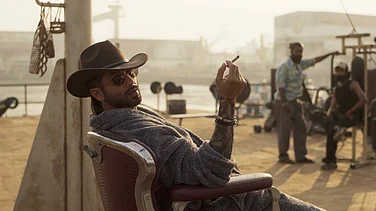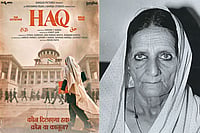There is a haunting, unsettling quality to Leena Manimekalai’s 'Maadthy: An Unfairy Tale' (2019) from the first frame. Though most of the film takes place out in the open, amidst lush fields, verdant forests and a flowing river, there is a sense of dread all through. The viewer is left guessing behind which tree, around which turn of the narrow path, or the bend in the river does danger lurk – the danger of men.
Yosana (Ajmina Kassim) is a young, spirited girl who loves to sway in the fields, swim in the river, soak in the rain. That’s the reason her mother Veni (Semmalar Annam) is petrified every time she can’t find Yosanna at home. She curses and beats her daughter for staying out, which at first seems an overreaction. But Veni, her husband Sudalai and Yosana are Puthurai Vannaar, a subcaste among the Dalits who are ‘unseeables’, they have to invisible to the dominant caste. If the Vannaar men come in their sight, the results can be devastating, they can be kicked and beaten till they bleed. It can be worse if the sighted are women.
It is this dread which Manimekalai makes flows from Veni to the viewer whenever Yosana is outside. In an inversion of the usual trope, there is a sequence of Yosana secretly gazing at Panneer (Patrick Raj), a young boy from the community, swimming naked in the river. But instead of it being sensuous the scene turns sinister as the camera cuts to the close up of the girl—what awaits her when the camera pulls back?
In an uncanny coincidence, I could draw parallels between Maadathy and Prayers For The Stolen (2021) by Tatiana Huezo Sanchez set half the way across the world in rural Mexico. Here too the surroundings are forests, hills and rivers, and every time the young Ana steps out her mother Rita is as worried as Veni. In Prayers…the predators are gun-toting child traffickers, where being beautiful is a curse, mothers cut their daughters’ hair and rub dirt on their smooth skins to make them ‘invisible’. Sanchez too makes the viewer feel the dread every time the girls are out, gaily running in the fields or take a lonely road.

Manimekalai makes this foreboding of violence, when it inevitably comes, even more unbearable by its casualness. For the men, brutally assaulting a woman, crushing her spirit, wounding her for life, doesn’t seem to be any more than lighting another beedi or pouring another glass of arrack. The film exposes the patriarchy and misogyny in the Dalit community, the layers of ‘caste’ within it, and how in the end the most oppressed and violated are always the women.
The ghost of Yosana is present among the trees, the fields, the river, and as it so often happens she is soon conveniently venerated as a deity.



























